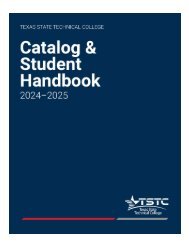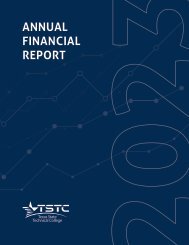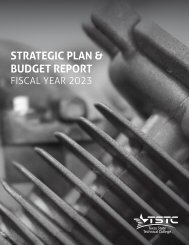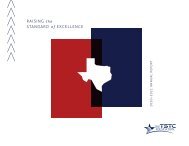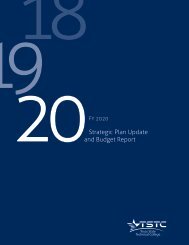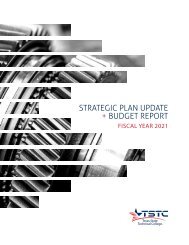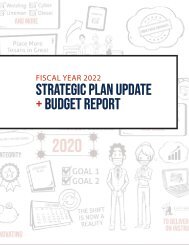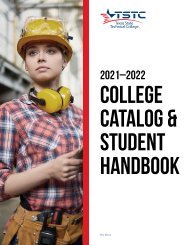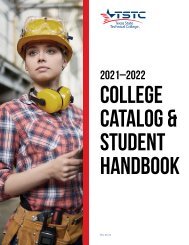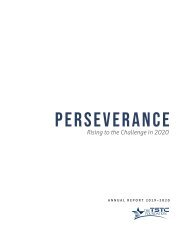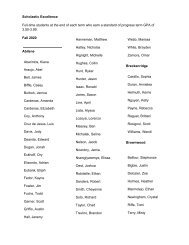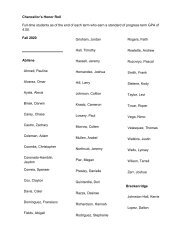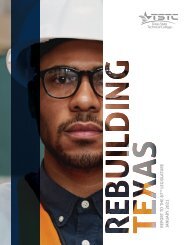TSTC Visual Standard Guide 2020
TSTC Visual Standards Guide 2020
TSTC Visual Standards Guide 2020
You also want an ePaper? Increase the reach of your titles
YUMPU automatically turns print PDFs into web optimized ePapers that Google loves.
COMMUNICATIONS / MEDIA & PUBLIC RELATIONS<br />
Media<br />
Inquiries<br />
News<br />
& Publicity<br />
In accordance with <strong>TSTC</strong> policy, all media inquiries<br />
or interview requests should be forwarded to the<br />
Communication department or the public relations<br />
representative on your campus. This is of particular<br />
importance if the matter in question is controversial or<br />
negative.<br />
The Communication department staff member or public<br />
relations representative will be responsible for:<br />
• Setting up interviews.<br />
• Prepping interviewees.<br />
• Facilitating media interviews.<br />
• Ensuring that the designated public information<br />
officer is informed of news/communications that<br />
affect its campus.<br />
• Handling media and disseminating information to the<br />
public during an emergency or crisis on a campus.<br />
<strong>TSTC</strong> best practices call for a Communication<br />
representative or designated public relations<br />
representative to be present during any media<br />
interview (even telephone interviews).<br />
When responding to media inquiries, campus and state<br />
public relations representatives should consider the<br />
benefits of the various response mechanisms available.<br />
Key messages should be considered for all media<br />
stories, as well as potential questions which could arise.<br />
Appropriate media training should occur for anyone<br />
being interviewed, depending on the individual’s media<br />
experience and comfort level.<br />
There are generally three types of interview<br />
possibilities:<br />
• Via email, where written response to questions is<br />
requested. This mechanism minimizes risk of being<br />
misquoted and minimizes facetime for the institution.<br />
It is a good choice for stories that are negative in<br />
nature.<br />
• Telephone interview. This is a good choice when<br />
television media or print media are simply needing<br />
data and information. It is always best for the campus<br />
public relations officer or designee to be present<br />
during the interview to help guide the responses<br />
toward the key messages.<br />
• In person, one-on-one interview. The interview<br />
should be with the highest available expert who<br />
can speak on the subject at hand. It is best for the<br />
public relations officer or a designee to be present to<br />
facilitate the interview and serve as an advocate for<br />
both the interviewee and the reporter.<br />
The <strong>TSTC</strong> Communication and Creative Services office<br />
is open from 8 a.m. until 5 p.m. After-hours media<br />
inquiries should be directed to the Executive Director<br />
of Communications, Dr. Kristina Campos-Davis at.<br />
254-867-2025 or 325-829-0364.<br />
Designated Public Information Officer:<br />
Abilene ....................... Kristina Campos-Davis<br />
Breckenridge ................. Kristina Campos-Davis<br />
Brownwood .................. Kristina Campos-Davis<br />
East Williamson County ....... Kristina Campos-Davis<br />
Fort Bend County ............. Kristina Campos-Davis<br />
Harlingen ..................... Kristina Campos-Davis<br />
Marshall ...................... Kristina Campos-Davis<br />
North Texas ................... Kristina Campos-Davis<br />
Sweetwater ................... Kristina Campos-Davis<br />
Waco ......................... Kristina Campos-Davis<br />
100<br />
<strong>TSTC</strong> | BRAND IDENTITY




